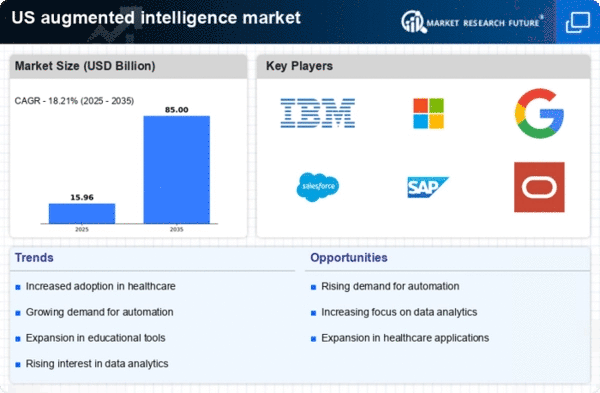Rising Demand for Automation
The augmented intelligence market is experiencing a surge in demand for automation across various sectors. Businesses are increasingly seeking to enhance operational efficiency and reduce human error through automated processes. This trend is particularly evident in industries such as manufacturing and logistics, where automation can lead to significant cost savings. According to recent estimates, the automation market is projected to reach $200 billion by 2026, indicating a robust growth trajectory. As organizations recognize the potential of augmented intelligence to streamline workflows and improve productivity, investments in this technology are likely to escalate. This rising demand for automation is a key driver for the augmented intelligence market, as companies strive to remain competitive in an evolving landscape.
Integration with IoT Technologies
The integration of augmented intelligence with Internet of Things (IoT) technologies is emerging as a pivotal driver. As IoT devices proliferate, the need for intelligent systems that can analyze and interpret vast amounts of data in real-time becomes increasingly critical. This integration allows for enhanced decision-making capabilities and predictive analytics, which are essential for industries such as agriculture, transportation, and smart cities. The IoT market is expected to grow to $1 trillion by 2026, and the synergy with augmented intelligence could further amplify this growth. Consequently, the convergence of these technologies is likely to propel advancements in the augmented intelligence market, fostering innovation and efficiency.
Growing Focus on Customer Experience
In the current landscape, there is a pronounced emphasis on enhancing customer experience, which serves as a significant driver for the augmented intelligence market. Companies are leveraging augmented intelligence to personalize interactions and provide tailored solutions to their customers. This trend is particularly relevant in sectors such as retail and finance, where understanding customer preferences can lead to increased loyalty and sales. Research indicates that businesses that prioritize customer experience can achieve revenue growth of up to 10% annually. As organizations strive to differentiate themselves in a competitive market, the adoption of augmented intelligence technologies to improve customer engagement is likely to accelerate, thereby driving growth in the augmented intelligence market.
Regulatory Support for AI Technologies
Regulatory support for artificial intelligence technologies is emerging as a vital driver for the augmented intelligence market. Governments are recognizing the importance of fostering innovation while ensuring ethical standards and safety in AI applications. In the US, initiatives aimed at promoting responsible AI development are gaining traction, which could lead to increased funding and resources for augmented intelligence projects. This supportive regulatory environment may encourage businesses to invest in augmented intelligence solutions, knowing that they are operating within a framework that prioritizes ethical considerations. As regulatory bodies continue to shape the landscape for AI technologies, the augmented intelligence market is likely to benefit from enhanced legitimacy and growth opportunities.
Advancements in Machine Learning Algorithms
The continuous advancements in machine learning algorithms are playing a crucial role in shaping the augmented intelligence market. These innovations enable systems to learn from data, adapt to new information, and improve over time, which enhances the overall effectiveness of augmented intelligence applications. Industries such as finance and healthcare are particularly benefiting from these advancements, as they allow for more accurate predictions and insights. The machine learning market is projected to reach $117 billion by 2027, suggesting a strong correlation with the growth of the augmented intelligence market. As organizations increasingly adopt these sophisticated algorithms, the potential for enhanced decision-making and operational efficiency will likely drive further investment in augmented intelligence solutions.
















